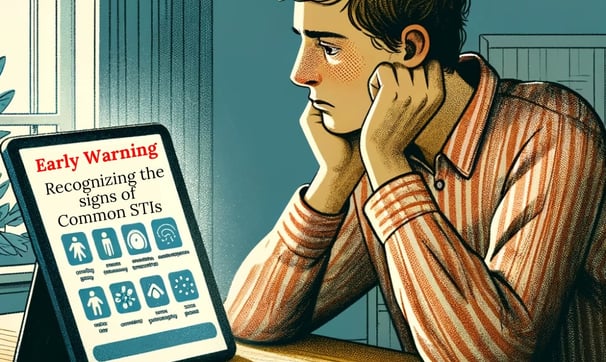Early Warning: Recognizing the Initial Signs of Common STIs
EDUCATION


Learn to identify early symptoms of common STIs. This blog post provides crucial information on early signs, promoting prompt testing and treatment for better sexual health.
Recognizing the Early Signs of Common STIs
Sexually transmitted infections (STIs) often have a stealthy onset, with early signs that can be easily overlooked. Recognizing these initial symptoms is essential for timely treatment and prevention of further transmission. This article highlights the early signs of some common STIs and underscores the importance of regular testing, such as the services offered by STDCheck.com.
Chlamydia
Early Signs: Chlamydia is notoriously asymptomatic in many cases, but when symptoms do appear, they can include abnormal genital discharge, a burning sensation during urination, and, in women, pain during intercourse or bleeding between periods.
Gonorrhea
Early Signs: Similar to chlamydia, gonorrhea can present with a burning sensation when urinating, increased genital discharge, and in women, bleeding between periods. Men might experience pain or swelling in one testicle.
Genital Herpes
Early Signs: Herpes often begins with itching or pain, followed by sores or blisters around the genital area. Flu-like symptoms, such as fever and swollen lymph nodes, can also accompany these outbreaks.
Human Papillomavirus (HPV)
Early Signs: Most strains of HPV show no early symptoms. However, some types of HPV can cause genital warts, which may be small, large, raised, flat, or cauliflower-shaped.
Syphilis
Early Signs: The first sign of syphilis is usually a small, painless sore (chancre) at the infection site, often unnoticed. It may be followed by skin rashes and swollen lymph nodes.
HIV
Early Signs: Early HIV symptoms can mimic the flu, including fever, sore throat, fatigue, and swollen lymph nodes. These symptoms can appear and disappear within a few weeks.
Conclusion
Understanding and recognizing these early signs can lead to prompt testing and treatment. It's important to remember that many STIs can be asymptomatic. Regular STI testing, such as the services provided by STDCheck.com, is crucial in maintaining your sexual health and preventing the spread of infections.
Remember, early detection is key in managing STIs effectively. If you suspect you have been exposed to an STI or are experiencing symptoms, seek medical advice and consider getting tested. Knowledge and proactive measures are your best defense against the impact of STIs.
